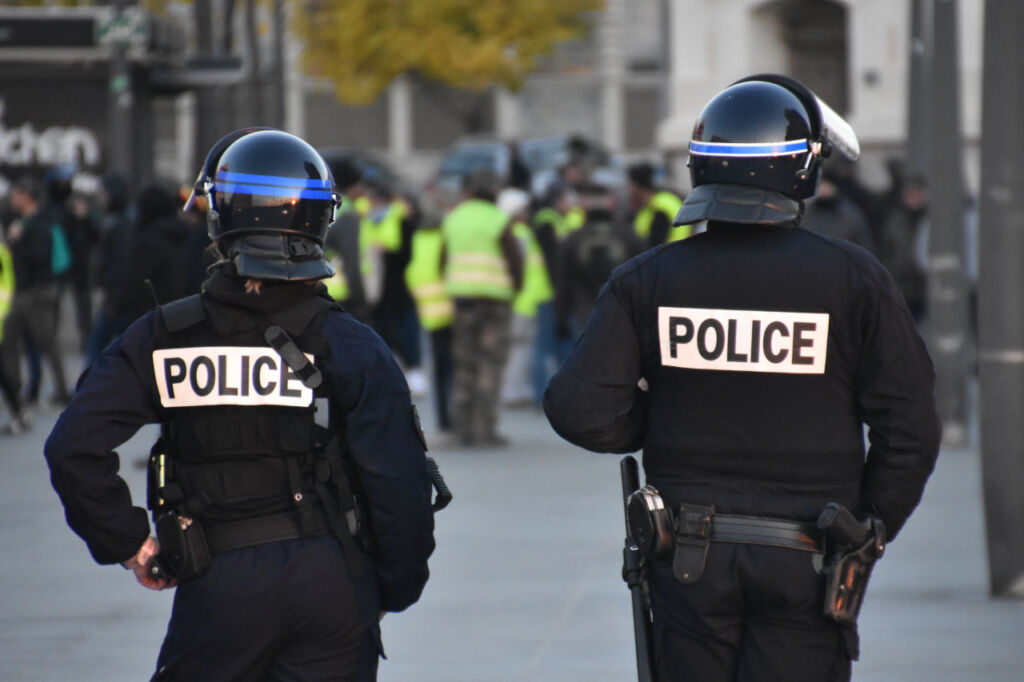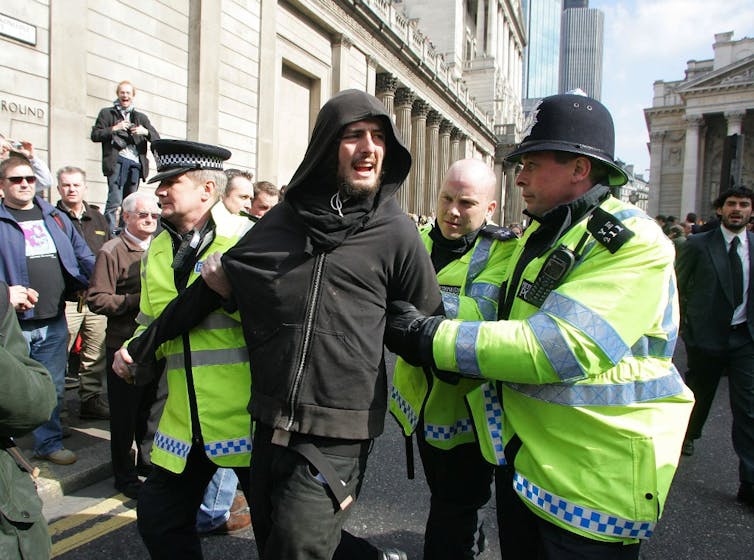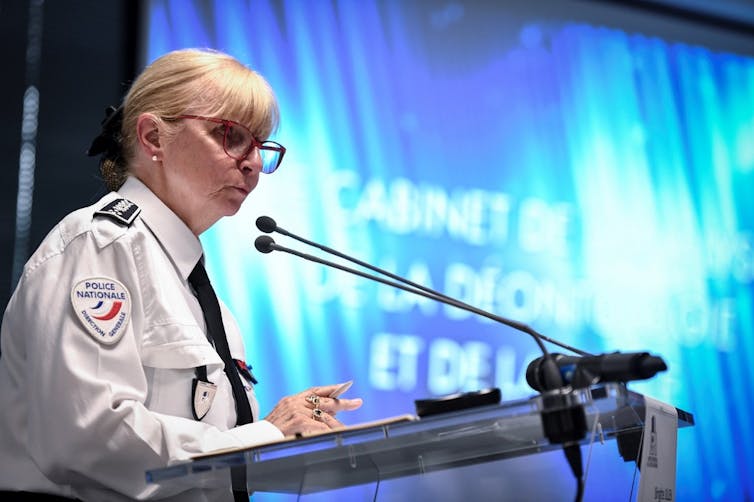Policing the police: from theory to practice
For several months now, criticism has been pouring down on the police in general and the IGPN (General Inspectorate of the National Police) in particular. Protests against pension reform, the "yellow vest" movement, high school student demonstrations, and then enforcement of emergency measures during lockdown have highlighted the violent or abusive behavior of some police officers.
Stéphane Lemercier, University of Montpellier

Add to this the suspicions of widespread racism in the police force following the death of George Floyd, an African American killed by a police officer in the United States —in a context that has nothing to do with that of French society—and the publication of a counter-assessment questioning the official version of the death of Adama Traoré in a gendarmerie in 2016: it didn't take much more to drive thousands of demonstrators onto the streets to protest against police violence.
Under pressure, the President of the Republic even ordered the Minister of the Interior to quickly complete a study launched last January, which consisted of making proposals to improve the ethics of law enforcement after the death of a man during a police operation.
But what exactly are we talking about? How and by whom is the French police force controlled? How are foreign police forces controlled?
Police control in theory
In France, controlling deviant behavior within the police force is primarily the responsibility of the police officers themselves: Article R 434-26 of the Internal Security Code designates each police officer as the custodian of the Code of Ethics and the guarantor of its enforcement.
However, various studies have shown that police culture is very strong, which does not encourage police officers to report their peers. However, Article 40 of the Code of Criminal Procedure stipulates that "any public officer or civil servant who, in the exercise of their duties, becomes aware of a crime or offense, is required to notify the public prosecutor without delay..."
However, this text is rarely enforced.
Ultimately, it is the General Inspectorate of the National Police that is the official body responsible for monitoring the police. It conducts administrative and judicial investigations into breaches of ethical rules and offenses committed by police officers. These investigators are feared by all civil servants because they have a reputation for getting results, even if some sometimes question their effectiveness, independence, or impartiality.
But for sociologist Sébastien Roché, "Police officers investigating police officers is not satisfactory." He therefore suggests establishing an external oversight body independent of the French police, as is the case in many other countries.
Supervisory bodies in France and abroad
This supervisory body already exists in France: it is the Defender of Rights. This constitutional authority, created in 2011, has the power to ensure compliance with the rules of professional conduct for security professionals.
In its latest annual report published on June 8, 2020, for the year 2019, it is noted that it handled 1,957 cases concerning the ethics of the security forces, compared to 1,520 the previous year.
This represents only 2.4% of its total activity, far behind cases concerning social protection, traffic law, or legal matters. But above all, the ombudsman found breaches of professional ethics in only 10% of the cases handled!
Looking abroad, most security force oversight bodies are grouped together within the IPCAN (Independent Police Complaints Authority Network), a professional network for informal exchanges and cooperation that mainly brings together European countries, but not exclusively.

Geoff Caddick/AFP
In the United Kingdom,the Independent Office for Police Conduct is cited as an example for its transparency and guarantee of independence. It is headed by a figure who has never served as a police officer, and its members cannot have been police officers either.
In Quebec, there is a police ethics commissioner (often a former lawyer or magistrate) who receives complaints against police officers who have violated the Quebec Police Ethics Code.
In Denmark, there is an independent police complaints authority that investigates criminal offenses committed by police officers. It is headed by a High Court judge who works with a prosecutor, a law professor, and two representatives of civil society. Its members are appointed by the Minister of Justice and must be reappointed every four years.
In Norway, the Norwegian Bureau for the Investigation of Police Affairs is composed of former police officers and lawyers who investigate members of the police force suspected of having committed criminal or ethical offenses. In Australia, there isthe Australian Commission for Law Enforcement Integrity (ACLEI), headed by a judge and responsible for investigating police officers and combating corruption in the administration.
In Belgium, there is the P Committee, which is headed by a magistrate. Its members are appointed by the House of Representatives. Its representative says that "it is a service of the legislative branch set up to assist the latter in its control of the executive branch."
Finally, in Switzerland, there is a police ombudsman, which is an independent body dedicated to dialogue, information, and advice for the public, but it has no power of control or sanction. The same is true in Spain, Ireland, Greece, Finland, Serbia, Slovakia, and Hungary, where "police ombudsmen" receive reports of inappropriate behavior by police officers and then refer them to the courts if they believe that a fault has been committed.
Police control in practice
In France,the independence of the IGPN has often been called into question, even though its chief insists that she receives no instructions from senior management. The fact that it is a service that reports to the Director General of the National Police and the Minister of the Interior does not work in its favor...
In terms of transparency, the IGPN has made positive progress in recent years with the publication of an annual report that provides figures on its investigations. Since 2018, data collected on those injured and killed by the police has also been made public. However, Cédric Moreau de Bellaing and Sébastian Roché, two researchers who have examined dozens of procedures conducted by the IGPN over a seven-year period, have noted "a lack of sincerity in the search for the truth."

Stephane De Sakutin/AFP
Claudine Angeli-Troccaz (Deputy Ombudsman in charge of security ethics issues) believes that:
"In order to ensure the proper functioning of democratic institutions, it is now essential to avoid limiting security issues to a purely financial perspective or to issues of confrontation and escalation, and instead to place ethics at the center of security debates and do everything possible to change professional cultures, which is a prerequisite for changing practices."
It is high time to take radical measures, and the creation of a College of General Inspections of the Ministry of the Interior by an emergency decree issued on June 10, 2020, will not improve the situation. It is time to consider efficient and innovative measures.
Reflexive practices and possible developments
The IOPC (the British equivalent of the IGPN) regularly publishes a magazine for police services called "Learning and Lessons." Each issue focuses on a specific topic: arrests, managing demonstrations, protecting vulnerable members of the public, etc. Based on real-life situations, it details what went wrong and draws lessons to prevent similar setbacks from happening again.
This is already what the IGPN is doing with regard to occupational risks through the AMARIS project (Improving Risk Management), which analyzes the most frequently encountered risk situations in order to propose a prevention approach by producing awareness-raising fact sheets distributed in police stations. The IGPN could draw heavily on this approach to do the same with bad police practices, and cases could be raised and discussed during the initial training of police cadets and during the continuing training of senior officers.
The IGPN should focus on its audit, support, and advisory missions for the services that request them and open itself up to a mediation mission between the police and the public, based on the Hungarian, Greek, or Finnish ombudsman model. It could leave the "administrative and judicial investigations" aspect to an external and independent authority such as the National Security Ethics Commission (the CNDS was created by Law No. 2000-494 of June 6, 2000). This administrative body, established by the Jospin government, was composed of four members of parliament, representatives of the Council of State, the Court of Cassation, and the Court of Auditors, and six qualified individuals. It had significant legal powers, as professional secrecy could not be invoked against it, and any refusal to respond to it constituted a criminal offense. However, a lack of financial resources, competition with the IGPN (General Inspectorate of the National Police), and the undermining efforts of certain police unions led to its dissolution in 2011.
France, which was a pioneer in police oversight with the creation of the National Police Code of Ethics in 1986, followed by the creation of the CNDS in 2000, has for too long been reluctant to deal with inappropriate behavior by police officers that tarnishes the entire institution.
By implementing reflective practices based on the English model, redefining the IGPN's missions, and creating a National Ethics Commission for Security with sufficient resources, the police and police officers could regain a certain legitimacy and the population could regain a police force it could rely on.![]()
Stéphane Lemercier, Lecturer – Member of the Montpellier Criminal Law Team (EDPM), University of Montpellier
This article is republished from The Conversation under a Creative Commons license. Readthe original article.